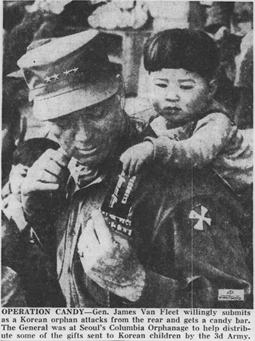 General Van Fleet petitioning the audience to contribute to his AKF emergency fund drive in support of Korean humanitarian aid on an episode of CBS’ “What’s My Line?” in July 1953
General Van Fleet petitioning the audience to contribute to his AKF emergency fund drive in support of Korean humanitarian aid on an episode of CBS’ “What’s My Line?” in July 1953"In this spirit, General Van Fleet began campaigning for funds to support aid and reconstruction efforts in Korea almost immediately upon returning to the U.S. He served instrumental roles in the American-Korean Foundation (AKF), including serving as AKF chairman through the mid-1950s. After leading several successful humanitarian fundraising drives as leader of the AKF, General Van Fleet sought to expand his efforts beyond relief and into initiatives to strengthen ties between the peoples of the United States and Korea."
To this end, General Van Fleet recruited famed leaders such as Henry Luce of Time Life, William Randolph Hearst, Jr., Arthur Hays Sulzberger of The New York Times, Spyros P. Skouras of Twentieth Century Fox, the first Korean ambassador to the UN Ben C. Lim, Julliard President William Schuman, and prominent real estate developer William Zeckendorf. Together, this group, along with other business leaders and former military officers, founded the Korea Society.




